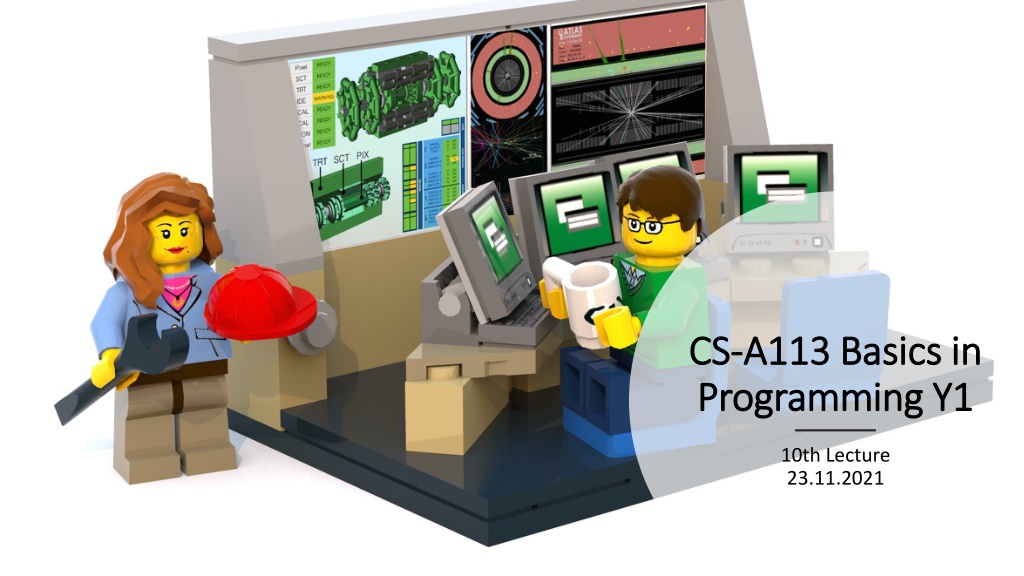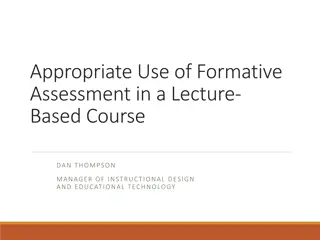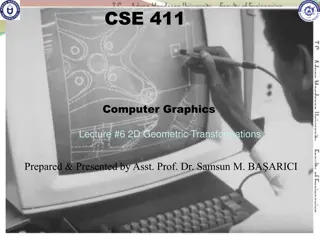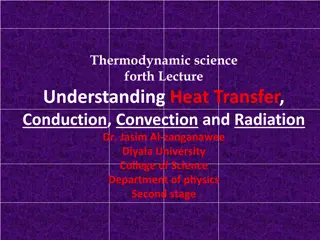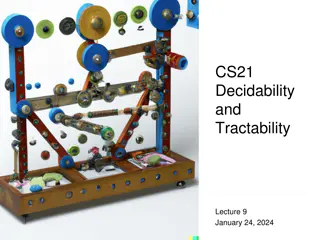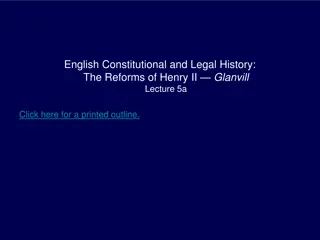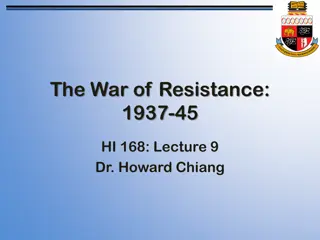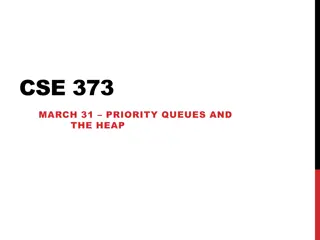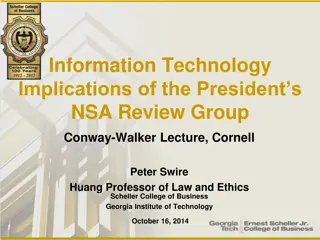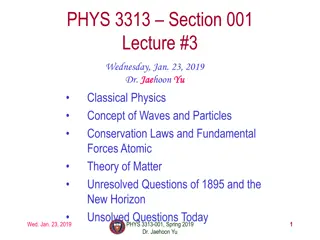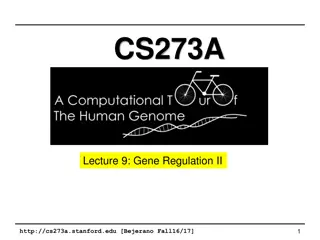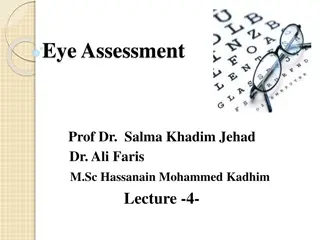Implementing Goldbach's Conjecture in Programming: A Practical Guide
Exploring the famous Goldbach's Conjecture in programming, this content provides a step-by-step approach to implementing a checker for the theorem. From outlining the necessary parts to structuring code and iterating through prime numbers, this guide offers a hands-on perspective on tackling this mathematical concept through programming.
Download Presentation

Please find below an Image/Link to download the presentation.
The content on the website is provided AS IS for your information and personal use only. It may not be sold, licensed, or shared on other websites without obtaining consent from the author. Download presentation by click this link. If you encounter any issues during the download, it is possible that the publisher has removed the file from their server.
E N D
Presentation Transcript
CS CS- -A113 Basics in A113 Basics in Programming Y1 Programming Y1 10th Lecture 23.11.2021
The Lecture: Different Today Join with Video We are coding together Open your microphone we discuss things together We will NOT record the session today
Interactions Today: Go to: http://presemo.aalto.fi/csa1113
Goldbach`s Conjecture (1742) Every even number greater than two can be written as the sum of two primes
How do we start such a task? 1. Write down what you need Implement a checker for Goldbach s Theorem for the first n numbers: 2. Write down a rough sketch of your code and define your subtasks 3. Structure each subtask 4. Implement the subtasks
How do we start such a task? 1. Write down what you need Implement a checker for Goldbach s Theorem for the first n numbers: 2. Write down a rough sketch of your code and define your subtasks 3. Structure each subtask 4. Implement the subtasks
What are the parts needed List of Prime numbers Iterating through all numbers up to and inclusive n Test if there is a sum of 2 prime numbers Iterating through the prime number list twice
How do we start such a task? 1. Write down what you need Implement a checker for Goldbach s Theorem for the first n numbers: 2. Write down a rough sketch of your code and define your subtasks 3. Structure each subtask 4. Implement the subtasks
Code overview test_Goldbach(n): for i in range(all even numbers larger than 2 until n):
Code overview test_Goldbach(n): for i in range(all even numbers larger than 2 until n): can i be the sum of two primes?
Code overview find all Prime numbers until n test_Goldbach(n): for i in range(all even numbers larger than 2 until n): can i be the sum of two primes?
Code overview #find all Prime numbers until n myPrimes = getPrimes(n) test_Goldbach(n): for i in range(all even numbers larger than 2 until n): can i be the sum of two primes?
How do we start such a task? 1. Write down what you need Implement a checker for Goldbach s Theorem for the first n numbers: 2. Write down a rough sketch of your code and define your subtasks 3. Structure each subtask (pseudocode) 4. Implement the subtasks
What is a Prime Number? A prime number is a natural number greater than 1 that is not a product of two smaller natural numbers. Prime numbers: 2,3,5,7,11,... NOT Prime numbers: 1,4,6,8,9,10,12,...
Prime Number Sieve Add numbers to a list if it is not divisible by any of the number already in the list: With which number do you start? myPrimes = 2 3 5 7 11 13 17 19 23 29
Prime Number Sieve Add numbers to a list if it is not divisible by any of the number already in the list: With which number do you start? myPrimes = 2 3 5 7 11 13 17 19 23 29
Prime Number Sieve Add numbers to a list if it is not divisible by any of the number already in the list: Next number 3 is 3 dividable by any number on the list so far? myPrimes = 2 3 5 7 11 13 17 19 23 29
Prime Number Sieve Add numbers to a list if it is not divisible by any of the number already in the list: Next number 4 is 4 dividable by any number on the list so far? myPrimes = 2 3 5 7 11 13 17 19 23 29
Prime Number Sieve Add numbers to a list if it is not divisible by any of the number already in the list: Next number 5 is 5 dividable by any number on the list so far? myPrimes = 2 3 5 7 11 13 17 19 23 29
Prime Number Sieve Add numbers to a list if it is not divisible by any of the number already in the list: Next number 6 is 6 dividable by any number on the list so far? myPrimes = 2 3 5 7 11 13 17 19 23 29
Prime Number Sieve Add numbers to a list if it is not divisible by any of the number already in the list: Next number 7 is 7 dividable by any number on the list so far? myPrimes = 2 3 5 7 11 13 17 19 23 29
Prime Number Sieve Add numbers to a list if it is not divisible by any of the number already in the list: Next number 8 is 8 dividable by any number on the list so far? myPrimes = 2 3 5 7 11 13 17 19 23 29
Prime Number Sieve Add numbers to a list if it is not divisible by any of the number already in the list: Next number 9 is 9 dividable by any number on the list so far? myPrimes = 2 3 5 7 11 13 17 19 23 29
Prime Number Sieve Add numbers to a list if it is not divisible by any of the number already in the list: Next number 10 is 10 dividable by any number on the list so far? myPrimes = 2 3 5 7 11 13 17 19 23 29
Prime Number Sieve Add numbers to a list if it is not divisible by any of the number already in the list: Next number 11 is 11 dividable by any number on the list so far? myPrimes = 2 3 5 7 11 13 17 19 23 29
Prime Number Sieve Add numbers to a list if it is not divisible by any of the number already in the list: Next number 12,13... myPrimes = 2 3 5 7 11 13 17 19 23 29
Prime Number Sieve Add numbers to a list if it is not divisible by any of the number already in the list: Next number 14,15,16,17 myPrimes = 2 3 5 7 11 13 17 19 23 29
Prime Number Sieve Add numbers to a list if it is not divisible by any of the number already in the list: Next number 14,15,16,17 myPrimes = 2 3 5 7 11 13 17 19 23 29
Prime Number Sieve Add numbers to a list if it is not divisible by any of the number already in the list: Next number 18,19,... myPrimes = 2 3 5 7 11 13 17 19 23 29
Prime Number Sieve Add numbers to a list if it is not divisible by any of the number already in the list: Next number 18,19,... myPrimes = 2 3 5 7 11 13 17 19 23 29
Sieve of Eratosthenes Division is expensive for computers: Can we find the Prime numbers in a better way without testing for division? YES Sieve of Eratosthenes Idea: Start with a list of numbers. If you find a prime, mark all multiples of this number as NOT prime: 2 4,6,8,10,12,14,... marked 3 6,9,12,15,18,... marked 4 is marked 5 10,15,20,25,... marked 6 is marked 7 14,21,28 9 is marked 10 is marked 11 22,33,44,
How to implement the Sieve of Eratosthenes? Start with a list of size n where each entry is True myPrimes = [True]*n Mark all the multiples (of numbers that are still True when you iterate over them) with False Iterate over the remaining list all indices with entry True are prime numbers myPrimesClean = []
How do we start such a task? 1. Write down what you need Implement a checker for Goldbach s Theorem for the first n numbers: 2. Write down a rough sketch of your code and define your subtasks 3. Structure each subtask 4. Implement the subtasks and the main task
Code overview #find all Prime numbers until n myPrimes = getPrimes(n) test_Goldbach(n): for i in range(all even numbers larger than 2 until n): can i be the sum of two primes? range(x,y,z)
Code overview #find all Prime numbers until n myPrimes = getPrimes(n) test_Goldbach(n): for i in range(4,n+1,2): can i be the sum of two primes?
Code overview #find all Prime numbers until n myPrimes = getPrimes(n) test_Goldbach(n): for i in range(4,n+1,2): can i be the sum of two primes? Iterate through ALL pairs of primes
Code overview #find all Prime numbers until n myPrimes = getPrimes(n) test_Goldbach(n): for i in range(4,n+1,2): can i be the sum of two primes? 2 / 2 Iterate through ALL pairs of primes Prim1/Prime2 2 3 5 7 2 2 / 3 2 / 5 2 / 7 3 3 / 2 3 / 3 3 / 5 3 / 7 5 5 / 2 5 / 3 5 / 5 5 / 7 7 7 / 2 7 / 3 7 / 5 5 / 7
Code overview #find all Prime numbers until n myPrimes = getPrimes(n) test_Goldbach(n): for i in range(4,n+1,2): for prime1 in myPrimes: for prime2 in myPrimes: if (What do I test here?): print() Iterate through ALL pairs of primes
Code overview #find all Prime numbers until n myPrimes = getPrimes(n) test_Goldbach(n): for i in range(4,n+1,2): for prime1 in myPrimes: for prime2 in myPrimes: if (prime1+prime2==i): print(f '{i} = {prime1} + {prime2}.) Iterate through ALL pairs of primes
getPrimes def getPrimes(myN): if myN < 2: return [] else: myPrimes = [2] for i in range(3,myN + 1): isPrime = True for testDivider in myPrimes: if ((i % testDivider) == 0): isPrime = False if isPrime: myPrimes.append(i) return myPrimes
checkGoldbach def checkGoldbach(): n = 40 primeList = getPrimes(n) for i in range(4,n+1,2): #test if i can be written by 2 primes sumSuccess = False for prime1 in primeList: for prime2 in primeList: if (prime1+prime2 == i) and (not sumSuccess): sumSuccess = True print(f'{i} = {prime1} + {prime2}.') if not sumSuccess: print(f'{i} = could not be formulated by the sum of two primes.')
